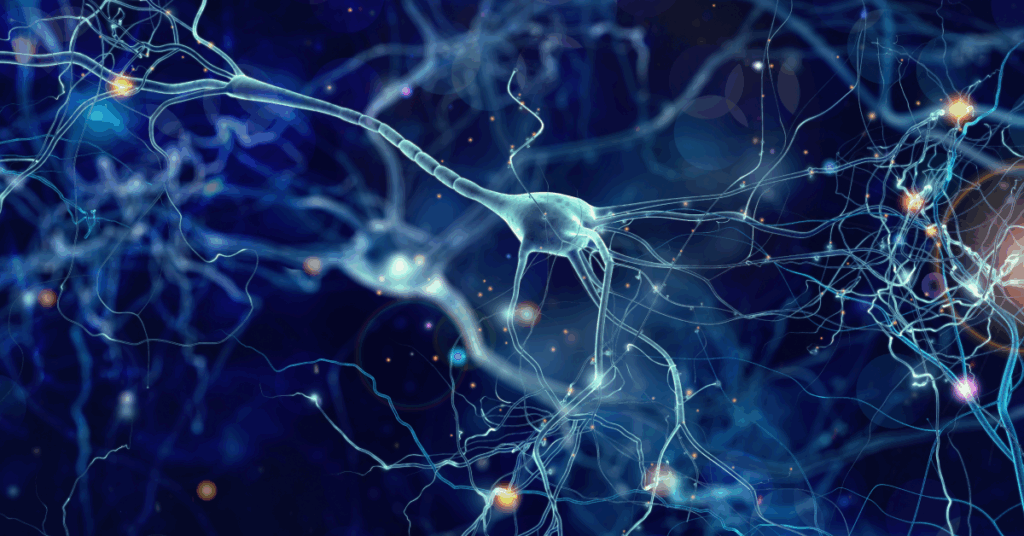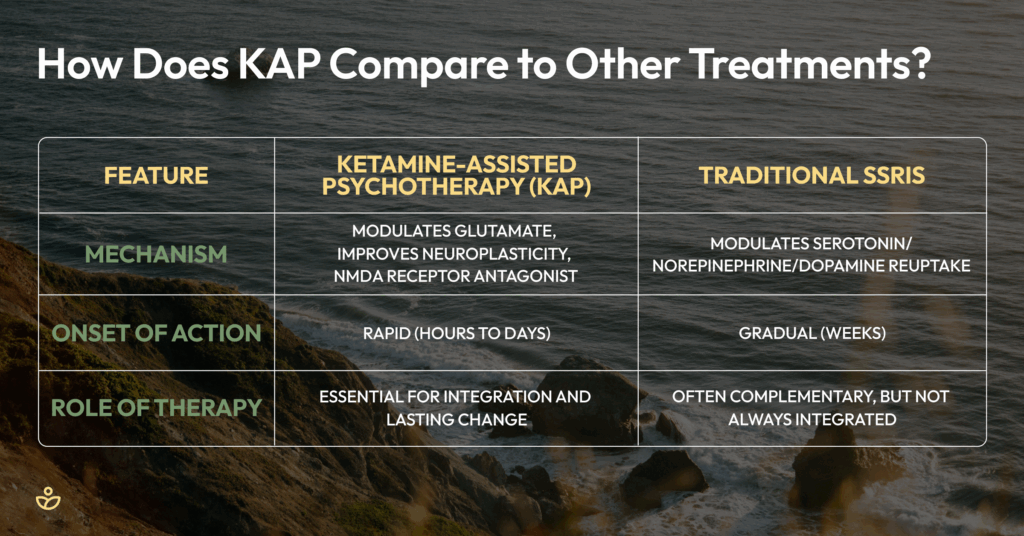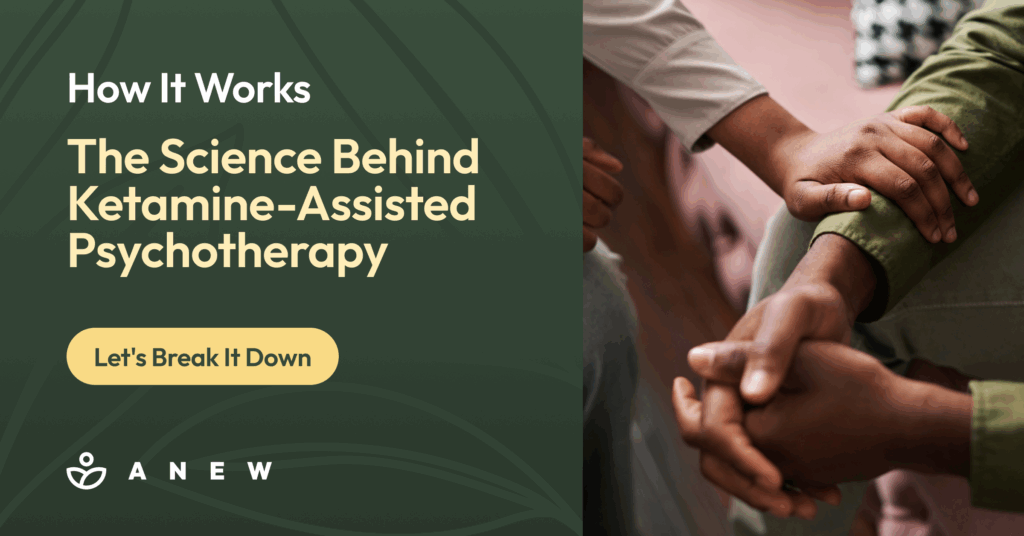For many people struggling with treatment-resistant depression, anxiety, or trauma, the treatment journey can feel like an endless cycle of trial and error. Traditional therapy and medications, while effective for some, often fall short for those with more complex or persistent symptoms. If you’ve cycled through multiple antidepressants and spent years in talk therapy, yet still feel stuck in the same painful patterns, the emergence of ketamine-assisted psychotherapy (KAP) offers a powerful new source of hope.
Here’s what makes KAP different:
- Uses low, controlled doses of ketamine to safely induce neuroplasticity
- Creates a temporary “window” for deep therapeutic breakthroughs
- Sessions are guided by trained clinicians in a calming, monitored setting
- Focuses on integration, turning insights into lasting change
This isn’t just another treatment option; it’s a fundamentally different approach. Research shows that KAP can be effective in up to 60-70% of patients with treatment-resistant depression, offering profound healing where other approaches have failed. It works by temporarily “opening” the brain’s capacity for change while providing the therapeutic support needed to make those changes stick.
How Does Ketamine-Assisted Psychotherapy Work? The Complete Process
Understanding how ketamine-assisted psychotherapy works means seeing it as a synergistic approach combining neuroscience and compassionate therapy. At Anew Therapy Utah, this medically supervised treatment opens the mind for deeper therapeutic work. If your brain is stuck in old mental patterns, ketamine temporarily creates new routes while your therapist helps you steer them.
The Science: How Ketamine Rewires the Brain for Healing
Ketamine’s primary mechanism of action is as an NMDA receptor antagonist. In conditions like depression and anxiety, certain neural circuits can become overactive and rigid, trapping the brain in negative feedback loops. Ketamine works by temporarily blocking these NMDA receptors, which disrupts this hyperactive signaling. This disruption is not just a pause; it’s a catalyst for change. It triggers a surge in the release of a different neurotransmitter, glutamate, which in turn stimulates the production of brain-derived neurotrophic factor (BDNF). Think of BDNF as a potent fertilizer for your brain cells. This vital protein promotes synaptogenesis—the rapid formation of new synapses, or connections between neurons.will increase your chances of obtaining approval for TMS treatment under DMBA.

This process boosts neuroplasticity, allowing your brain to rewire stubborn negative thought patterns. Unlike traditional antidepressants that work on the serotonin system over weeks, ketamine’s effect on the glutamate system can produce rapid antidepressant effects, sometimes within hours. For those with chronic pain, these neuroplastic changes can also interrupt pain signaling pathways.
You can explore more about these fascinating processes in this scientific research on ketamine’s mechanisms.
The KAP Journey: A Step-by-Step Guide to Your Sessions
Your KAP journey unfolds in three phases designed for safety and lasting change.
Phase 1: Preparation sets the foundation. It includes a thorough medical screening and psychiatric evaluation to ensure KAP is safe for you. Building a strong therapeutic alliance with your therapist is key, as is setting intentions for your treatment. For more details, see our article on Preparing for Ketamine Treatments: What Patients Need to Know.
Phase 2: The Ketamine Session is where change begins. You’ll receive a sub-anesthetic dose in a comfortable setting, creating a mild dissociative state to explore thoughts from a new perspective. Your therapist acts as a guide during the 60-90 minute session, ensuring your safety. You’ll rest in a calm room with soft music and an eye mask while your vitals are monitored.
Phase 3: Integration is where lasting change happens. In post-experience therapy sessions, your therapist helps you process insights and translate them into actionable changes. This work helps sustain the effects of ketamine long after the session.
What Conditions Can Ketamine-Assisted Psychotherapy Treat?
KAP has shown remarkable promise for a spectrum of mental health conditions, especially for those who haven’t found relief with conventional treatments.
- Major Depressive Disorder (MDD) and Treatment-Resistant Depression (TRD) are among the most successful applications. Studies show that 60-70% of patients with TRD experience significant improvement.
- Post-Traumatic Stress Disorder (PTSD) also responds well, as KAP can help people process traumatic memories in a less overwhelming way, leading to sustained relief.
- Anxiety Disorders and Obsessive-Compulsive Disorder (OCD) often improve as KAP helps individuals break free from chronic patterns of worry and fear.
- Chronic Pain patients can benefit from ketamine’s dual action on both physical discomfort and the psychological distress that accompanies it.
Emerging research is also exploring KAP’s potential for:
- Bipolar Depression, where standard antidepressants may carry risks
- End-of-life anxiety in terminal illness, offering peace and clarity in difficult moments
- Addiction Recovery, particularly with substances like alcohol and opioids, when combined with integration therapy
Is KAP Right For You? A Guide to Benefits, Risks, and Next Steps
Making an informed decision about KAP requires a holistic view of the treatment, understanding its benefits and limitations. The importance of a qualified provider cannot be overstated.
The Transformative Benefits of KAP
The real-world results of KAP can be profound. Many clients experience rapid relief from symptoms, sometimes within hours of their first session. One of the most significant benefits is breaking through therapeutic plateaus. KAP can create new neural pathways and perspectives, helping you move past issues that felt stuck for years in traditional talk therapy.
Clients often report gaining new perspectives on trauma, observing past experiences with newfound self-compassion. This increased self-awareness and improved motivation for change, combined with professional integration, can lead to long-term effects and lasting healing.
Patients often describe their experiences as deeply spiritual or transcendent, helping them reframe meaning, identity, and purpose. These shifts can influence not only mood but relationships, creativity, and personal fulfillment.
Understanding Risks and Candidate Suitability
KAP is a safe procedure when administered correctly, but it’s important to be aware of potential side effects. During a session, some people experience temporary nausea, dizziness, or increased blood pressure. Challenging psychological experiences like anxiety or confusion are possible, but your therapist is present to guide you through them safely.
KAP is not right for everyone. Good candidates have often found traditional treatments ineffective and are motivated to engage in the deep therapeutic work of integration. However, KAP is not recommended for individuals with a history of psychosis, uncontrolled hypertension, severe cardiovascular disease, active substance abuse, or for those who are pregnant.
How Does KAP Compare to Other Treatments?
Understanding KAP becomes clearer when compared to other approaches.
Vs. Traditional Therapy: While talk therapy is valuable, KAP can accelerate the therapeutic process. The neuroplasticity created by ketamine opens windows for insights that might otherwise take months or years to achieve.Vs. SSRIs: Traditional antidepressants work on the serotonin system and can take weeks to show effects. Ketamine provides a faster onset of action by working on the glutamate system to rapidly change neural connectivity.

Next Steps: What to Do If You’re Considering KAP
If you’ve struggled with mental health challenges that haven’t responded to other treatments, you’re not out of options. KAP offers a scientifically-backed path forward that bridges the gap between medication and therapy.
At Anew Therapy in Utah, we’re honored to guide people through this transformative process. Learn more about our approach to Ketamine-Assisted Psychotherapy and find whether this innovative treatment might be your next step toward healing.

Searching for the best ketamine therapy clinic in Utah? Anew Therapy offers expert care and proven results. Schedule your free evaluation today.

